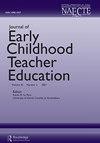幼儿高等教育中学生反思性实践教学法的体验
IF 1.3
Q3 EDUCATION & EDUCATIONAL RESEARCH
Journal of Early Childhood Teacher Education
Pub Date : 2021-12-23
DOI:10.1080/10901027.2021.2020938
引用次数: 2
摘要
幼儿教育是一个要求很高的职业,教师的压力与他们与幼儿互动的质量成反比。为了在进入该领域之前为职前教师提供压力管理工具,人们对将反思实践作为高等教育教学法的一部分越来越感兴趣。有初步证据表明,反思性实践有可能对职前教师的幸福感和教学实践产生积极影响。两所大学的教师在幼儿课程中引入了反思性实践,包括日记、课堂讨论和正念。这些课程的学生被邀请参加焦点小组,讨论他们在将反思实践作为课程教学方法的一部分方面的经验;有21名学生参加(课程1的n=13,课程2的n=8)。通过不断的比较分析,出现了两个主要主题:1)参与者描述了在课程中使用反思性实践的过程和结构的重要方面,2)参与者报告了反思性实践如何支持他们的社会情感理解和幸福感。讨论了使用反思性实践的含义,包括丰富的描述、例子和实践建议,作为幼儿高等教育学的一部分。本文章由计算机程序翻译,如有差异,请以英文原文为准。
Students’ experiences of reflective practices as pedagogy in early childhood higher education
ABSTRACT Early childhood education is a demanding profession, and teachers’ stress is inversely associated with the quality of their interactions with young children. In order to provide stress management tools to preservice teachers prior to entry into the field, there has been growing interest in the use of reflective practices as part of higher education pedagogy. There is initial evidence that reflective practices have the potential to positively influence preservice teachers’ well-being and teaching practice. Instructors at two universities incorporated the use of reflective practices, including journaling, in-class discussions, and mindfulness, into their early childhood courses. Students from these courses were invited to participate in focus groups regarding their experiences with the use of reflective practices as part of their course’s pedagogical approach; 21 students participated (n for Course 1 = 13, n for Course 2 = 8). Using constant comparative analysis, two primary themes emerged: 1) participants described important aspects of the process and structure of using reflective practices as part of their course, and 2) participants reported how reflective practices supported their social-emotional understanding and well-being. Implications for using reflective practices, including rich descriptions, examples, and practice suggestions, as part of early childhood higher education pedagogy are discussed.
求助全文
通过发布文献求助,成功后即可免费获取论文全文。
去求助
来源期刊

Journal of Early Childhood Teacher Education
EDUCATION & EDUCATIONAL RESEARCH-
CiteScore
2.20
自引率
16.70%
发文量
27
期刊介绍:
The Journal of Early Childhood Teacher Education, the official journal of the National Association of Early Childhood Teacher Educators, publishes original manuscripts, reviews, and information about association activities. Its purpose is to provide a forum for consideration of issues and for exchange of information and ideas about research and practice in early childhood teacher education. JECTE welcomes research reports, position papers, essays on current issues, reflective reports on innovative teacher education practices, letters to the editor and book reviews.
 求助内容:
求助内容: 应助结果提醒方式:
应助结果提醒方式:


